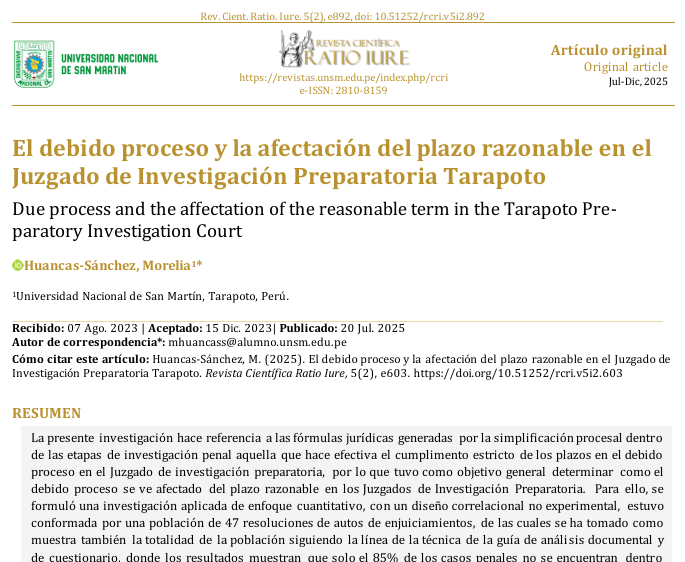Due process and the affectation of the reasonable term in the Tarapoto Pre-paratory Investigation Court
DOI:
https://doi.org/10.51252/rcri.v5i2.603Keywords:
procedural conduct, prosecution control, defendants, new criminal procedure code, presumption of innocenceAbstract
The present investigation refers to the legal formulas generated by the procedural simplification within the criminal investigation stages, which makes effective the strict compliance with the deadlines in due process in the Preparatory Investigation Court, for which it had as a general objective to determine how due process is affected by the reasonable term in the Preparatory Investigation Courts. For this, an applied research with a quantitative approach was formulated, with a non-experimental correlational design, it was made up of a population of 47 resolutions of lawsuits, of which the entire population has also been taken as a sample following the line of the technique of the documentary and questionnaire analysis guide, where the results show that only 85% of criminal cases are not found within a reasonable time, denoting the little interest in resolving criminal proceedings, which is concludes that there is a violation of the right of affectation of the aggrieved subjecting him to a criminal process that does not have the necessary guarantees to ensure the correct development of the process, in addition, the court does not resolve the requests for procedural momentum in due process.
Downloads
References
Arroyo, N. (2020). Debido proceso y motivación de las decisiones en el proceso penal dominicano. Revista de la Facultad de Derecho de México, 70(277-I), 77. https://doi.org/10.22201/fder.24488933e.2020.277-I.76255
Colchado Farfán, C. E. (2021). La prescripción extraordinaria del delito como límite al plazo razonable en el proceso penal peruano [Universidad de Piura]. https://hdl.handle.net/11042/4948
Diaz Saldaña, M. M. (2020). La constitucionalización del plazo razonable en la investigación preparatoria. Universidad San Pedro.
Guerrero Ocaña, H., & Rojas Lujan, V. W. (2022). Plazos procesales y el debido proceso como garantías en un estado de derecho, 2021. Ciencia Latina Revista Científica Multidisciplinar, 6(4), 2089-2103. https://doi.org/10.37811/cl_rcm.v6i4.2741
Gutiérrez, E., Cantos, D., & Durán, R. (2019). Vulneración del debido proceso en el procedimiento penal abreviado. Universidad Y Sociedad, 11(4), 414–423. https://rus.ucf.edu.cu/index.php/rus/article/view/1322
Hernández Sampieri, R., Fernández collado, C., & Baptista Lucio, M. D. (2014). Metodología de la Investigación (6.a ed.). McGRAW-HILL / INTERAMERICANA EDITORES, S.A.
Lema Espinoza, H. F. (2022). El Debido Proceso y la Criminalística. Revista Scientific, 7(23), 158-170. https://doi.org/10.29394/Scientific.issn.2542-2987.2022.7.23.8.158-170
Lorca Navarrete, A. M. (2023). La intrusión del debido proceso en el ordenamiento constitucional español. ACTA JURÍDICA PERUANA, 5(2), 73-88. https://doi.org/10.56891/ajp.v5i2.322
Lozano Díaz, N., & Pérez Pineda, Y. M. (2022). El derecho al plazo razonable en la etapa intermedia y de juzgamiento en los Juzgados de Investigación Preparatoria y de Juzgamiento del distrito de Paiján en el año 2019. DERECHO UCT, 1(1), 46-69. https://doi.org/10.46363/derecho.v1i1.5
Mendoza Quispe, W. M., & Padilla del Aguila, J. (2022). Vulneración al plazo razonable en el proceso inmediato en casos de flagrancia en el Perú, 2021 [Universidad Privada del Norte]. https://hdl.handle.net/11537/31217
Merchán Valencia, J. L. (2022). Imprescriptibilidad de los delitos contra la administración pública y el derecho al plazo razonable [Universidad Privada Antenor Orrego]. https://hdl.handle.net/20.500.12759/9935
Ñaupas Paitán, H., Valdivia Dueñas, M. R., Palacios Vilela, J. J., & Romero Delgado, H. E. (2018). Metodología de la Investigación cuantitativa-cualitativa y redacción de la tesis (5.a ed.). Ediciones de la U.
Osorio, R., Vizcarra, F., & Cotrado, S. (2023). Tutela jurisdiccional efectiva y plazo razonable en la calificación del ministerio público peruano. Instituto Universitario de Innovación Ciencia y Tecnología Inudi Perú. https://doi.org/10.35622/inudi.b.083
Ramirez García, S. T. (2020). El proceso penal por faltas y su incidencia con el principio del debido proceso en la Comisaria Uchuglla, Moyobamba 2019 [Universidad Cesar Vallejo]. https://hdl.handle.net/20.500.12692/57754
Rodríguez, M. (2018). La defensa penal eficaz. Universidad y Sociedad, 10(3), 134-141. http://scielo.sld.cu/pdf/rus/v10n1/2218-3620-rus-10-01-336.pdf
Segura Alfredo, P. O. (2018). Análisis y aplicación del plazo razonable en el proceso penal y su incidencia en el debido proceso [Universidad siglo 21]. https://repositorio.21.edu.ar/items/63f5963d-1827-4a55-be38-d7a4cde9c40d#:~:text=https%3A//repositorio.21.edu.ar/handle/ues21/15841
Ttito Carpio, E. (2020). Debido proceso, plazo razonable y su vulneración en la investigación preliminar del proceso penal en el distrito de Santa Ana, La Convención, Cusco, 2019 [Universidad Andina del Cusco]. https://hdl.handle.net/20.500.12557/3857

Downloads
Published
How to Cite
Issue
Section
License
Copyright (c) 2025 Morelia Huancas-Sánchez

This work is licensed under a Creative Commons Attribution 4.0 International License.
The authors retain their rights:
a. The authors retain their trademark and patent rights, as well as any process or procedure described in the article.
b. The authors retain the right to share, copy, distribute, execute and publicly communicate the article published in the Ratio Iure Scientific Journal (RCRI) (for example, place it in an institutional repository or publish it in a book), with an acknowledgment of its initial publication in the RCRI.
c. Authors retain the right to make a subsequent publication of their work, to use the article or any part of it (for example: a compilation of their works, notes for conferences, thesis, or for a book), provided that they indicate the source of publication (authors of the work, journal, volume, number and date).






